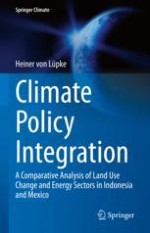
2022 | OriginalPaper | Chapter
1. The Case for Climate Policy Integration
Author : Heiner von Lüpke
Published in: Climate Policy Integration
Publisher: Springer International Publishing
Activate our intelligent search to find suitable subject content or patents.
Select sections of text to find matching patents with Artificial Intelligence. powered by
Select sections of text to find additional relevant content using AI-assisted search. powered by